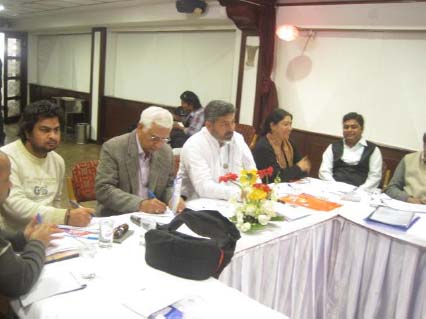Contamination, Pollution and Quality
Draft National Water Policy (2012) fails to take into account the multiple, complex problems and issues relating to water in India says M S Vani
Posted on 18 Mar, 2012 05:49 PMGuest post by: M S Vani
Perusing the draft, one comes across all the ‘right’ concepts, words liberally sprinkled throughout the document, describing the resource:-
- Natural resource
- Hydrological cycle
- Ecological needs of rivers
- Climate change
- Sources pollution
and our intended response to it :-
Status of water supply in in class-I cities and class-II towns of Uttar Pradesh (UP)
Posted on 17 Mar, 2012 10:15 PMSource: Central Pollution Control Board’s 2009-10 Report
Class of cities/towns |
Integrated water management for rural/urban India: Common effluent treatment plant can conserve fresh water in industrial estates
Posted on 17 Mar, 2012 11:02 AMAuthors : Vasudevan Rajaram and John R. Sheaffer
Lessons for rural water supply - Assessing progress towards sustainable service delivery - India - IRC International Water and Sanitation Centre, The Hague
Posted on 10 Mar, 2012 04:24 PMThe study looked beyond a simple description of the situation towards broader processes of decentralisation and political leadership, in an attempt to unpack what has gone right or, as in many cases, what has gone wrong, within the rural water sub-sector.
National Environmental Engineering Research Institute seeks opinion from the public on the concept of groundwater recharge with treated municipal wastewater
Posted on 09 Mar, 2012 02:24 PMGuest post by: Anisha Nijhawan
Drafting a new National water policy, 2012 without consulting the farmers would be meaningless
Posted on 04 Mar, 2012 11:02 PMAuthor : Phanish Sinha
In India, water problems are 'man made': Comments on the draft water policy-2012
Posted on 29 Feb, 2012 11:02 AMAuthor : Nagesh Hegde
Draft National Water Policy 2012 - Dialogue organised by NEER Foundation, Meerut on February 18, 2012
Posted on 27 Feb, 2012 10:07 AMGuest post by: Raman Kant Tyagi

Quantitative data on water quality: A compilation of papers that present physico-chemical analyses of various water sources in India
Posted on 24 Feb, 2012 08:31 AMAssessment of physico-chemical quality of groundwater in rural area nearby Sagar city, Madhya Pradesh
This paper presents the results of forty groundwater samples collected from June 2007 to July 2010 in Gambhira and Baheria villages in Madhya Pradesh. The authors conclude that the ground water quality is degraded due to anthropogenic causes.
"In search of old ideas" - A discussion of the draft national water policy 2012, by Jayanta Bandopadhyay in The Telegraph
Posted on 22 Feb, 2012 05:05 PMAuthor: Jayanta Bandopadhyay
Article and image courtesy: The Telegraph





